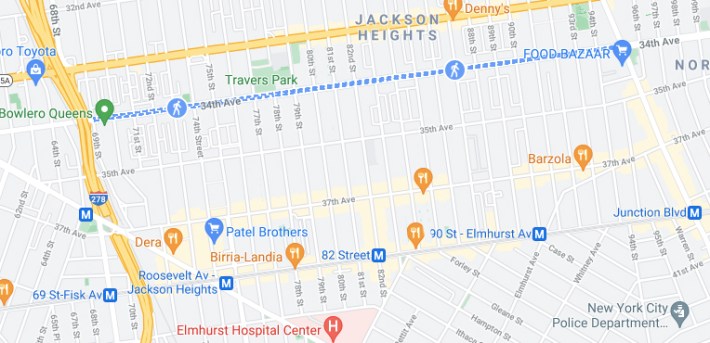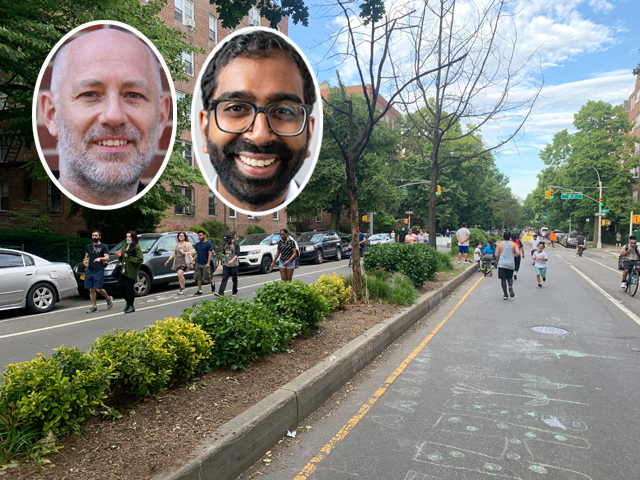This is the latest in our ongoing series of opinion pieces in favor of converting the 34th Avenue open street into a linear park, which is the subject of a new petition drive that seeks a logical final conclusion to what the Department of Transportation calls “the gold standard” of open streets. Earlier this week, we published support from Assembly Member Jessica González-Rojas and Borough President Donovan Richards. This piece is from urban planner Donovan Finn and City Council candidate Shekar Krishnan.

Immigrant neighborhoods like Jackson Heights and Elmhurst deserve access to open space, clean air, and safe streets just like any other part of this city. Prioritizing these goals in communities like ours will undo glaring racial and environmental injustices that stretch back to the era of Robert Moses and even before.
Today, we have the opportunity to transform 34th Avenue into a car-free, safe, and accessible open space -- a linear park. This forward-thinking act will enrich the lives of thousands of neighborhood residents every day as well as for generations to come.
We have dedicated our careers – one as a civil rights attorney and the other as an urban planner – to making New York City a more sustainable and humane place. We know the history of racist planning decisions upon which this city was built, and in our professional lives, one simple lesson resonates more than any other: the neighborhood where you live largely determines how safe and healthy you are.
Instead of blindly accepting harmful policies of the past, we must view these issues through their proper historical context. Jackson Heights, among the most diverse and most densely populated communities on the planet, has some of the least amount of open space in New York City. As the pandemic demonstrated, this is a matter of public health and racial justice. Our communities were the epicenter of the COVID-19 pandemic because of systemic inequality -- including an overwhelmed public health care system and many residents who simply could not socially isolate because of overcrowded, unaffordable housing.
34th Avenue was critically important in mitigating the effects of the pandemic. It provided desperately-needed open space for many immigrant and working class residents who do not own a car or have access to a backyard or private garden. Some can’t even afford a subway swipe to Flushing Meadows. Re-envisioning 34th Avenue as permanent open green space will continue to meet these urgent needs even as the COVID-19 pandemic subsides.
Public space must work in the service of the public. This, after all, is the purpose of government -- to allocate scarce resources in the most equitable way possible. Perhaps 100 years ago the decision to abdicate more than one quarter of the city’s land area to cars seemed like a progressive idea. But today, it is clearly a regressive policy harmful to the health, safety and economic welfare of this city, especially its most vulnerable residents.

Some of our neighbors are concerned that this plan will cause gentrification by increasing property values. But on close inspection, this argument proves to be no more than a cynical diversion from the true issues faced by our community and a self-serving scare tactic by those who would prefer the inequitable status quo over a more just city.
For decades, environmental and public health concerns of low income neighborhoods and communities of color have been overlooked while other places enjoy an over-abundance of these resources. To deny some residents access to green space that other communities take for granted in the name of constraining housing prices is not only bad policy, it is a false choice, all but assuring the continuation of the inequities we see around us. We should not seek to deprive some neighborhoods of vital resources in the name of affordability. This is a contrived conflict. Instead, we need to ensure that resources are distributed equitably to remedy longstanding injustices. This involves advocating for a government that supports working people by providing affordable housing; mandating living wages; and investing in schools, transit, and social supports.
And let us be clear about this: public space in this city must be accessible for everyone. Accessibility and open space must never be in conflict with each other nor should they be designed that way. We can work together to assure that seniors, individuals with disabilities and Access-A-Ride users will continue to be supported. Our community has shown time and again that we can bring people together and strengthen our community through the process of creating new public space like Diversity Plaza and expanding Travers Park. Equitably re-imagining the function of our shared public roadways has already been shown to work here and has widespread community support.
Today we have a moral obligation to undo the ill-advised and outdated planning decisions of the past and build a more sustainable, resilient, and equitable future starting right here. The conversion of 34th Avenue into a car-free linear park is an opportunity for a neighborhood far from the centers of city power to illustrate how a people-led movement for safe streets and environmental justice can be a model for efforts citywide. There is no question that this plan will require tradeoffs. But think of what we will gain:
- Eight acres of new public open space in a neighborhood that has the worst access to open space of any neighborhood in New York City.
- A safe place for children to play and move throughout the neighborhood with minimal risk from automobile violence.
- A 1.3 mile promenade free of car exhaust, pollution, loud engines, and incessant honking as thru traffic is forced onto Northern Boulevard, where it belongs.
- A public resource for active and passive recreation and improving the physical and mental health of residents.
- A piece of public infrastructure that will support outdoor learning and physical education at the four public schools and two preschools along the avenue.
- A mechanism for mitigating climate change and addressing the environmental injustices that plague our community by reducing heat gain on hot summer days, absorbing stormwater, and filtering the air of toxic pollutants.
Converting 34th Avenue into an automobile-free public space and expanding this concept to other parts of the city, is one small but important step in beginning to address these historic and deep-seated racial and economic inequities. Change is hard, but some changes are important enough to fight for. This is one of them.
Donovan Finn is assistant professor of Environmental Design, Policy, & Planning at Stony Brook University and a founding member of the Jackson Heights Green Alliance. He’s on Twitter @donovanfinn and Instagram @covidstreetscapes. Shekar Krishnan is a Democrat running for City Council in Jackson Heights and Elmhurst, a civil rights lawyer, co-founder of Friends of Diversity Plaza and a safe streets activist. He's on Twitter @voteshekar.






